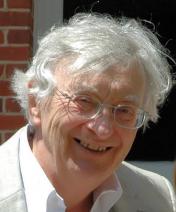Related Research Articles

Ernst Rüdin was a Swiss-born German psychiatrist, geneticist, eugenicist and Nazi, rising to prominence under Emil Kraepelin and assuming the directorship at the German Institute for Psychiatric Research in Munich. While he has been credited as a pioneer of psychiatric inheritance studies, he also argued for, designed, justified and funded the mass sterilization and clinical killing of adults and children.

The Institute of Psychiatry, Psychology & Neuroscience (IoPPN) is a centre for mental health and neuroscience research, education and training in Europe. It is dedicated to understanding, preventing and treating mental illness, neurological conditions, and other conditions that affect the brain. The IoPPN is a faculty of King's College London, England, and was previously known as the Institute of Psychiatry (IoP).
The biopsychiatry controversy is a dispute over which viewpoint should predominate and form a basis of psychiatric theory and practice. The debate is a criticism of a claimed strict biological view of psychiatric thinking. Its critics include disparate groups such as the antipsychiatry movement and some academics.
Psychiatric genetics is a subfield of behavioral neurogenetics and behavioral genetics which studies the role of genetics in the development of mental disorders. The basic principle behind psychiatric genetics is that genetic polymorphisms are part of the causation of psychiatric disorders.
Gene–environment correlation is said to occur when exposure to environmental conditions depends on an individual's genotype.

Irving Isadore Gottesman was an American professor of psychology who devoted most of his career to the study of the genetics of schizophrenia. He wrote 17 books and more than 290 other publications, mostly on schizophrenia and behavioral genetics, and created the first academic program on behavioral genetics in the United States. He won awards such as the Hofheimer Prize for Research, the highest award from the American Psychiatric Association for psychiatric research. Lastly, Gottesman was a professor in the psychology department at the University of Minnesota, where he received his Ph.D.
The Max Planck Institute of Psychiatry is a scientific institute based in the city of Munich in Germany specializing in psychiatry. Currently directed by Elisabeth Binder and Alon Chen, it is one of the 81 institutes in the Max Planck Society.

Susan Smalley is an American behavioral geneticist, writer and activist. The co-author of Fully Present: The Science, Art, and Practice of Mindfulness, she is the founder of the UCLA Mindful Awareness Research Center at the Jane and Terry Semel Institute for Neuroscience and Human Behavior (MARC), and professor emerita in the department of psychiatry and biobehavioral sciences at UCLA. Her research centers on the genetic basis of childhood-onset behavior disorders, such as ADHD, and the cognitive and emotional impact of mindfulness meditation on health and wellbeing. She has published more than 100 peer-reviewed papers and lectured globally on the genetics of human behavior and the science of mindfulness.
Behavioural genetics, also referred to as behaviour genetics, is a field of scientific research that uses genetic methods to investigate the nature and origins of individual differences in behaviour. While the name "behavioural genetics" connotes a focus on genetic influences, the field broadly investigates the extent to which genetic and environmental factors influence individual differences, and the development of research designs that can remove the confounding of genes and environment. Behavioural genetics was founded as a scientific discipline by Francis Galton in the late 19th century, only to be discredited through association with eugenics movements before and during World War II. In the latter half of the 20th century, the field saw renewed prominence with research on inheritance of behaviour and mental illness in humans, as well as research on genetically informative model organisms through selective breeding and crosses. In the late 20th and early 21st centuries, technological advances in molecular genetics made it possible to measure and modify the genome directly. This led to major advances in model organism research and in human studies, leading to new scientific discoveries.
The Semel Institute for Neuroscience and Human Behavior is a research institute of the University of California Los Angeles (UCLA). It includes a number of centers, including the "Center for Neurobehavioral Genetics", which uses DNA sequencing, gene expression studies, bioinformatics, and the genetic manipulation of model organisms to understand brain and behavioral phenotypes.

Kenneth S. Kendler is an American psychiatrist best known for his pioneering research in psychiatric genetics, particularly the genetic causes of schizophrenia. Kendler is one of the highest cited psychiatry researchers. Between 1990 and 1998 he was the 2nd highest cited psychiatrist, and for the 1997–2007 decade he was ranked 4th by Thomson Reuters' Science Watch. He has authored over 1,200 papers and in 2016 his h-index was 126. Kendler's group was also noted for the replication of a study of Avshalom Caspi on the interaction of stressful life events and a serotonin transporter polymorphism in the prediction of episodes of major depression.
Terrie Edith Moffitt is an American-British clinical psychologist who is best known for her pioneering research on the development of antisocial behavior and for her collaboration with colleague and partner Avshalom Caspi in research on gene-environment interactions in mental disorders.

Lindon J. Eaves (1944–2022) was a behavior geneticist and priest who published on topics as diverse as the heritability of religion and psychopathology. His research encompassed the development of mathematical models reflecting competing theories of the causes and familial transmission of human human differences, the design of studies for the resolution, analytical methods for parameter estimation and hypothesis-testing and application to substantive questions about specific (human) traits. He was the first to consider standardized variance components for heritability estimates and was the first to consider the effects of living with a relative on the behavior of a person. Furthermore, he was the first to think about genotype x age interaction and set up the algebra to study the effects of genes working in males as well as females, making it possible to use twins pairs of opposite-sex. Together with Nick Martin, he wrote many classic papers, one of which is "The genetic analysis of covariance structure". They also wrote the book, Genes, culture and personality: An empirical approach. In 2012, a Festschrift was held in Edinburgh dedicated to Eaves' work; the proceedings were subsequently published in Behavior Genetics.
Daniel H. Geschwind is an American physician-scientist whose laboratory has made pioneering discoveries in the biology of brain disorders and the genetic and genomic analyses of the nervous system. His laboratory showed that gene co-expression has a reproducible network structure that can be used to understand neurobiological mechanisms in health, evolution, and disease. He led the first studies to define the molecular pathology of autism spectrum disorder (ASD) and several other psychiatric disorders, and has made major contributions to defining the genetic basis of autism.
Kenneth Francis Schaffner is an emeritus Distinguished University Professor, University Professor of Philosophy and Psychology, and Professor of Psychiatry at the University of Pittsburgh. He specializes in the history of science and the philosophy of science.
Michael C. Neale is a British behavior geneticist and professor at the Virginia Institute for Psychiatric and Behavioral Genetics at Virginia Commonwealth University. He is known for his research in the field of psychiatric genetics, which aims to determine the roles of genetic and environmental factors in psychiatric disorders and substance abuse. He is estimated to have mentored over 2,000 students in his field. He was president of the Behavior Genetics Association from 2009 to 2010.
Jonathan Flint is a British behavior geneticist and Professor in Residence in the Department of Psychiatry and Biobehavioral Sciences at the David Geffen School of Medicine at UCLA. He is also a senior scientist in the Center for Neurobehavioral Genetics at UCLA's Semel Institute for Neuroscience and Human Behavior.
Ming Tso Tsuang is an American psychiatrist and Distinguished Professor of Psychiatry at the University of California, San Diego. He is considered a pioneering researcher in the genetic epidemiology of schizophrenia and other severe mental disorders. Tsuang has authored and co-authored more than 600 publications and serves as founding and senior editor of the American Journal of Medical Genetics Part B.
Hermine H. M. Maes is a Belgian behavioral geneticist and Associate Professor in both the Department of Human and Molecular Genetics at the Virginia Commonwealth University School of Medicine and the Virginia Institute for Psychiatric and Behavioral Genetics. She received her Ph.D. from the Katholieke Universiteit Leuven in 1992. Maes' research focuses on the methodology of genetic epidemiology and the relationships between physical and mental health. Her husband and sometime research partner is Michael Neale.
Sagiv Shifman is an Israeli scientist, professor in the field of neurogenetics at the Alexander Silberman Institute of Life Sciences, The Hebrew University of Jerusalem. He holds the Arnold and Bess Zeldich Ungerman chair in Neurobiology.
References
- ↑ "Mission Statement". Virginia Institute for Psychiatric and Behavioral Genetics. Retrieved 2018-07-10.
- ↑ "Understanding The Etiology of Psychiatric Illnesses". Virginia Institute for Psychiatric and Behavioral Genetics. 2015-12-08. Retrieved 2018-07-10.
- ↑ "History". Virginia Institute for Psychiatric and Behavioral Genetics. Retrieved 2018-07-10.
- ↑ "Senate Joint Resolution No. 386". Legislative Information System. 2017-02-09. Retrieved 2018-07-10.